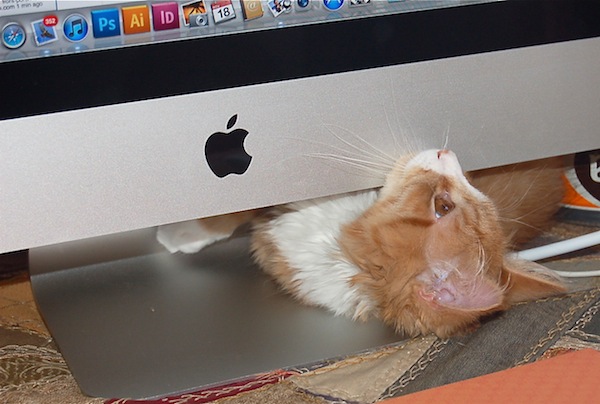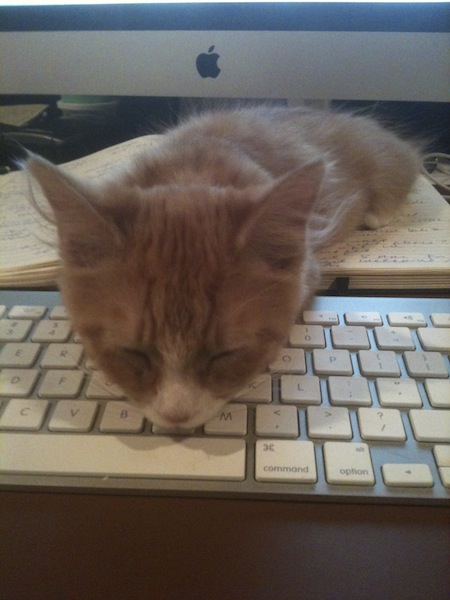I used to have a terrible time with insomnia. Used to — I have to knock on wood — don’t want to unleash the demons. I could get to sleep just fine, but would be wide awake a few hours later and could not get back to sleep.
Was it stress? The full of the moon? The French vanilla ice cream I had for dessert? Or could it be my electronic gadgets? I was addicted, yes addicted, to my cell phone. I was always monitoring emails, going on Facebook or googling something. I also frequently used my iPad in the evening — often propped up in bed playing solitaire, which I considered relaxing. And, at least one night a week, I watched my favorite TV shows until way past my bedtime.
A recent survey of 1508 American adults showed that 90% use some type of an electronic device at least a few nights a week within one hour of going to bed. So, I’m not alone. It’s a common behavior. Trouble is, it’s robbing us of valuable sleep.
Exposure to artificial light
Whether you’re on your cell phone, iPad or computer, playing video games or watching television before you go to bed, you are exposing yourself to artificial light, which suppresses the production of melatonin.
Melatonin is a hormone made by the pineal gland, which rests in the middle of our brains. During the day, the gland is fairly idle. But as soon as the sun goes down, it begins to produce melatonin, which makes us feel less alert and ready for sleep. When the sun rises, the amount of melatonin in your blood dips and you should feel more alert and ready to take on the day.
Exposure to artificial light before bedtime is bad for our health, according to a 2011 study by Joshua Gooley, Ph.D, a researcher at Brigham and Women’s Hospital and Harvard Medical School. “Our study shows that this exposure to indoor light has a strong suppressive effect on the hormone melatonin,” he says. “This could, in turn, have effects on sleep quality and the body’s ability to regulate body temperature, blood pressure and glucose levels.”
The blues and melatonin
Any kind of light can suppress melatonin, but blue light — which is emitted by electronics (and energy efficient light bulbs) — has the strongest effect. Another study, also conducted by Harvard Medical School and colleagues, compared 6.5 hours of exposure to blue light to 6.5 hours of exposure to green light, which has a longer wavelength than blue. Exposure to the blue light suppressed melatonin for about twice as long compared to the green. It also shifted circadian rhythms by twice as much.
But melatonin does more than help us sleep. It also appears to help fight off infections and slow the progression of cancer and other diseases, including diabetes, heart problems and depression. An article in the Harvard Health Letter states that, “Worse, research shows that it may contribute to the causation of cancer, diabetes, heart disease and obesity.”
Protect yourself
You may not be able to avoid looking at blue light altogether, but there are things you can do to lessen your exposure.
- Turn off all those brightly lit screens at least one hour before going to bed.
- Use dim red lights for night lights.
- If you work the night shift or have to use electronic devices at night, consider wearing glasses or goggles that block blue light.
- Expose yourself to lots of bright light during the day, which will boost your ability to sleep at night, as well as your mood and alertness during daylight.
What did I do?
How did I solve my sleep problem? Several small changes have made a big difference. First and foremost, I recognized that stress was a major cause of my waking up in the middle of the night. Once I came to terms with the cause of my stress and took steps to alleviate it as much as possible, I started sleeping better.
After reading that you should sleep in a totally darkened room, I noticed (at three o’clock one morning) that my bedroom was aglow with LED lights. For awhile, I wore a sleep mask, which worked immediately.
As for cutting down on my use of technology at night, I leave the iPad in the other room and although I keep my phone on my bedside table (in case of emergency,) I put it in the far corner, where it can’t be easily reached.
Besides looking at them before bed, I would also read things on my phone when I couldn’t get back to sleep. Do you remember reading a book under the covers with a flashlight? Well, I would read my phone under the covers. Not anymore!
What about you?
Do you take your electronic devices to bed with you? If you do, will you try to put them away at least one hour before bedtime?
Catching Health
In case you didn’t know, I send out a monthly Catching Health Newsletter that highlights recent posts you might have missed. It’s an easy way to stay in touch. I’d love it if you’d sign up!



Leave A Comment